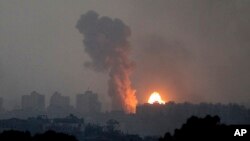U.N. Secretary-General Antonio Guterres said Saturday that he was encouraged by the growing international consensus for a cease-fire between Israel and Hamas, but that instead of a pause he was “surprised by an unprecedented escalation” of bombings in the Gaza Strip.
“This situation must be reversed,” Guterres said in a statement. “I reiterate my strong appeal for an immediate humanitarian cease-fire, together with the unconditional release of hostages and a delivery of humanitarian relief at the level that corresponds to the dramatic needs of the people in Gaza, where a humanitarian catastrophe is unfolding in front of our eyes.”
Guterres repeated his call for everyone to assume their responsibilities, saying “history will judge us all.”
The U.N. chief made an unannounced stopover Saturday in the Qatari capital, Doha, on his way to climate meetings in Nepal. He met with Prime Minister Sheikh Mohammed bin Abdulrahman bin Jassim Al Thani to discuss the crisis.
Qatar maintains good relations with Hamas, and its political wing has long maintained an office in the country. Qatar was instrumental in negotiating the release of two female hostages and is reported to be involved in trying to mediate the release of more.
The U.N. chief also spoke by phone with Egyptian President Abdel Fattah el-Sissi about the humanitarian situation. Egypt controls the Rafah border crossing with Gaza.
Guterres said the military escalation is undermining the effort to get scaled-up humanitarian aid into Gaza, as well as facilitate the release of Hamas-held hostages and the evacuation of third-country nationals from Gaza.
Israel intensifies offensive
Israel announced Friday night that it was expanding its ground activity in Gaza and cut internet and telephone communications to the Hamas-controlled territory. By Saturday the military said it had intensified its attacks by land, air and sea on Hamas targets in Gaza.
The head of the U.N. agency that assists Palestinian refugees, UNRWA, said Saturday that Israel’s communications blackout “is yet another action taken to try to impede the humanitarian response” to civilians in Gaza.
“But I can assure you that this action will not discourage us,” Philippe Lazzarini wrote in a message to the 13,000 mostly Palestinian UNRWA staff based in Gaza. “Our determination remains unshaken. We will continue to fulfil our humanitarian duty, even in the face of these unprecedented challenges.”
The agency has confirmed that 53 of their staff have died in the bombings.
He and the U.N. chief both expressed grave concerns about their inability to reach U.N. staff because of the communications blackout.
“The bombing of the telecommunications infrastructure places the civilian population in grave danger,” said U.N. human rights chief Volker Turk. “Ambulances and civil defense teams are no longer able to locate the injured or the thousands of people estimated to be still under the rubble. Civilians are no longer able to receive updated information on where they can access humanitarian relief and where they may be in less danger. Many journalists can now no longer report on the situation.”
He warned that thousands more civilians could die in large-scale ground operations, and he urged de-escalation.
Humanitarian truce
Israel’s announcement of its expanded operation Friday night came as the U.N. General Assembly voted overwhelmingly for an immediate humanitarian truce.
The text, proposed by Jordan on behalf of Arab states, calls for “an immediate, durable and sustained humanitarian truce leading to a cessation of hostilities,” allowing for the safe provision of aid to Gaza and for the release of all civilians who are being held captive, among other elements.
The General Assembly loudly applauded the result of the vote: 120 countries in favor and 14 against. Israel and the United States were among the countries that voted against the measure.
The body’s resolutions are not legally binding, but they express the will of the international community.
“This ridiculous resolution has the audacity to call for a truce,” Israel’s ambassador, Gilad Erdan, said after the vote. “The goal of this resolution’s truce is that Israel should cease to defend itself to Hamas, so Hamas can light us on fire.”
He said there is “no humanitarian crisis in accordance with international humanitarian law” and said casualty reports from the Hamas-controlled health ministry in Gaza should not be trusted.
The General Assembly convened its special session after the Security Council failed to adopt a similar resolution calling for a humanitarian cease-fire. The council considered four different texts, but each failed to garner the necessary support or was blocked by a veto.
More than 2.2 million people live in the Gaza Strip, and the United Nations estimates more than 1.4 million of them have been displaced by the hostilities that erupted following Hamas’ October 7 terror attack on Israeli towns and cities that killed 1,400 people. Thousands of Palestinian civilians have been killed in Israel’s response to Hamas. Hamas is a U.S.-designated Foreign Terrorist Organization.
Limited humanitarian assistance started entering Gaza on October 21, but it has been slow, sporadic and insufficient to meet the rising needs. Fuel is urgently needed, but Israel has forbidden it, saying it believes Hamas is hoarding large fuel reserves and will divert new deliveries for their war machine.





